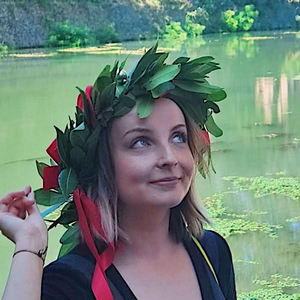Our testimonials: Mujde

Our testimonials: Mujde
Meet Mujde from Türkiye
Student Master’s in Cognitive Neuroscience and Clinical Neuropsychology
"I definitely feel more confident about my steps, and I cannot deny the role of the education I received in Padova and, of course, the precious people I met on my way!"

About myself
I am an international student living in Padova since 2020. Recently, I received my BA in Psychological Science, and nowadays I am getting ready to continue my academic journey by pursuing a master's in Cognitive Neuroscience and Clinical Neuropsychology.
I would describe myself as an open and curious person. Especially when it comes to studying, learning, or doing research, I am always full of energy! When I came here, I was not sure what I wanted to do in life. Of course, still not everything about the future is crystal clear, but I definitely feel more confident about my steps, and I cannot deny the role of the education I received in Padova and, of course, the precious people I met on my way!
After my first degree in anthropology, I developed a strong desire to further my education, and I grew more interest in the field of psychology, cognitive neuroscience in particular. I wanted to understand human behaviour and the way our mind works. Since 2021, I have been working as an undergraduate research assistant in my department, and I became a part of an international research team, working on different topics such as speech perception and language acquisition. Currently, we are investigating infants' abilities to perceive structural symmetry in mosaic-like abstract visual patterns.
Moreover, since the first year of my bachelor's, I have been voluntarily collaborating with a non-profit association located in Padova on suicide and traumatic death loss. I became particularly interested in the application of neurobiology and neuroimaging to understand the "suicidal brain" (both inside and outside suicidal states). I believe that my curiosity about the subjects and recent discoveries in the field of psychology will be a determinant for my own studies.
What are the best features of your degree?
The most important one, in my opinion, is the very rich intellectual environment our department provides. There are dynamic and open-minded scholars from all around the world studying and doing research on different topics (going from artificial intelligence to brain disorders, mental health, virtual reality, language acquisition, memory, and cognition, and so much more!). Even being able to meet these people by themselves is a very precious thing, let alone taking classes and collaborating with them.
Secondly here you are not just a passive learner going to classes and trying to pass exams as soon as possible. Students are encouraged to engage and learn through interactions with subjects and professors. This active learning, in my opinion, is crucial, and although at the beginning it may be hard to get used to it, once you do, learning becomes much more enjoyable!
Another thing that comes to mind is that, when you finish your psychology degree here, I believe you will be ready to continue your education with any specialization in psychology and neuroscience. It gives you a strong background in all these fields (and even those that are not directly connected to psychology but are still very relevant). This is precious because you may realize that you are interested in things that you never even thought about before.
And of course, as an international student, I must say that the international environment we have on our course is one of the best ones in Europe. In my class, there were students coming from more than 25 different countries around the world! Of course, we would always speak in English, and sometimes I even forgot that I was studying in Italy.
Application tips: how to prepare for the entry test in Psychology
When I submitted my application, the entry test in psychology was the SAT (scholastic aptitude test), which included questions on reading, writing, language, and math. It was not very difficult to prepare for the exam, but for the last two months, to be honest, I studied quite intensively.
Nowadays, I believe there is a different entry test, but as much as I know from other students who took it, high school-level knowledge on each subject should be enough. My biggest tip would be not to go into many details on subjects (because advanced levels will be covered during your bachelor's anyway). Sometimes we all think that learning as much as possible will always be beneficial for us. We try to memorize, and maybe this causes overload. Instead, obtaining a strong understanding will be more useful. Especially for biology and chemistry, I would suggest searching for videos on the internet visually representing the important processes (for example, DNA transcription and translation steps; it is much easier if you watch some animations about them; there are many out there!).
What advice would you give to potential students thinking of studying Psychology in Padua?
Psychology is a very broad field, and sometimes students’ expectations do not overlap with the aim of the programme. It may be the case that you are specifically interested in work and organizational psychology or more clinical aspects of psychology. If this is the case, it would be a mistake to expect classes only on these subjects. Our programme has a strong scientific research component as well, and it aims to provide knowledge on all the main aspects of psychology.
To avoid these confusions, I would suggest students try to understand their own interests and whether they match with this program. For example, you may check the syllabus for classes in advance. This will give you an idea of what you are going to learn here. Or talking to students or graduates to be sure you are on the right path.
What are some things people might not know about studying in Italy?
The examination system here is quite different: for each class, there are exam sessions. A class you took during the fall semester will have exam sessions typically in January, February, June-July-September. You need to decide when you want to give that class, and the best part is that if you get a bad grade, you may reject it and take the exam again in the next session! For me, this was an amazing thing because sometimes we all get anxious on exams, and I personally get particularly stressed if I know that I cannot take the exam again. Here, you experience this stress relatively less (at least this was the case for me), because it may happen that you get a very bad grade because you were tired, or maybe you couldn’t study enough, or you just made some basic errors. You can take it again and be sure that you learn the exam content well. Of course, overdoing that would also not be a good idea, but unless you keep your all good!
Tell me a bit about student life in Padua. What did you do for fun and where are your favourite places to spend time?
I think for many psychology students, the answer will be Portello! There is a nice river near our campus surrounded by cafes and bars. One of my favorite activities is to grab a beer and sit on the stairs on the lake after the class with my friends. Enjoy the sun and watch swimming swans!
Apart from this, I love the area near Beato Pellegrino (you must check the pictures of the library, it is a perfect spot for studying) and of course, Prato della Valle is always beautiful. Every time I go there, I actually remember that I live in Italy and it’s just so amazing. Also, living 20 minutes far from Venice and being able to go there for 4-5 euros as a student still sounds surreal to me.
Do you have any particular funny episode or memory when you were in Padua?
During my first two years in Padova I used to stay in one of the dormitories provided by university. My experience there was also very positive (still miss my old dorm) and we had a lot of funny moments there. One that comes to my mind is the fact that one of my Italian friends would organize pizza parties in which he would cook pizza for basically all students living in that dorm! Sometimes we would be 40 people in a small room eating pizza together and having beer. One of the best moments in my life.
MEET OUR TESTIMONIALS
Many students shared their experiences at the University of Padua.
Find out their stories!


